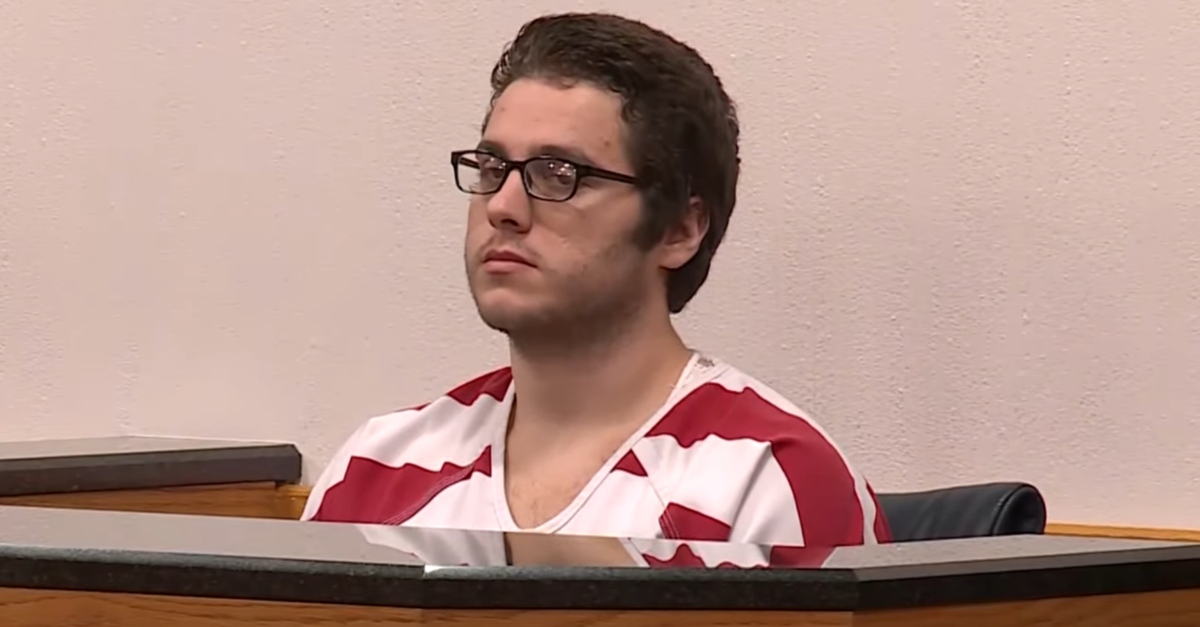The Tragic Story Of Austin Harrouff: A Cautionary Tale
Who is Austin Harrouff?
Austin Harrouff was a 19-year-old college student who became infamous in 2016 after he was arrested for the brutal murders of John Stevens III and Michelle Mishcon Stevens in Jupiter, Florida.
After his arrest, Harrouff exhibited bizarre behavior, including biting the face of one of the victims and consuming their flesh. He was eventually subdued by police and taken into custody.
- Pawn Stars Chumlee
- Hunter Hunter Most Famous Song
- Aaron Pierre Siblings
- Michael C Hall Height
- Alfred Enoch Wife
Harrouff was later diagnosed with schizophrenia and was found not guilty of the murders by reason of insanity. He was sentenced to life in prison.
Austin Harrouff
- The Murders: Harrouff's brutal murders of John Stevens III and Michelle Mishcon Stevens shocked the nation.
- The Insanity Defense: Harrouff's attorneys successfully argued that he was insane at the time of the murders.
- The Sentencing: Harrouff was sentenced to life in prison despite being found not guilty by reason of insanity.
The Murders
On August 15, 2016, Harrouff attacked John Stevens III and Michelle Mishcon Stevens in their garage. He stabbed them multiple times and bit the face of John Stevens III.
Harrouff then fled the scene and was later found by police walking down the street naked and covered in blood.
- Jyp Meme
- How Old Is Neuvillette
- Jude Bellingham Parents Origine
- Bre Tiesi Childhood
- Monica Bellucci Tim Burton
The Insanity Defense
Harrouff's attorneys argued that he was insane at the time of the murders due to a combination of mental illness and drug use.
The jury agreed with this defense and found Harrouff not guilty by reason of insanity.
The Sentencing
Despite being found not guilty by reason of insanity, Harrouff was sentenced to life in prison.
The judge ruled that Harrouff was a danger to society and needed to be kept in custody for the rest of his life.
Austin Harrouff
Austin Harrouff gained notoriety for his involvement in a highly publicized and gruesome double murder case in 2016. His actions and subsequent trial brought to light several key aspects related to mental health, the insanity defense, and the legal consequences of violent crimes.
- Mental Illness: Harrouff's mental health played a central role in the case, with experts testifying about his struggles with schizophrenia.
- Insanity Defense: Harrouff's attorneys successfully argued that he was not guilty by reason of insanity, highlighting the legal complexities surrounding mental illness and criminal responsibility.
- Violent Crime: The brutality of Harrouff's crimes shocked the nation, raising questions about the nature of violence and its impact on society.
- Legal Consequences: Despite being found not guilty by reason of insanity, Harrouff was still sentenced to life in prison, underscoring the legal system's response to individuals deemed dangerous.
- Public Outcry: Harrouff's case generated significant public outcry, reflecting the emotional toll that violent crimes can have on communities.
The key aspects of Austin Harrouff's case are interconnected and highlight the complexities of mental illness, the legal system, and the impact of violent crime. Harrouff's story serves as a reminder of the challenges society faces in addressing mental health issues and the consequences of violent behavior.
Mental Illness
Austin Harrouff's mental illness was a significant factor in his case. Experts testified that he had been struggling with schizophrenia for several years prior to the murders.
- Schizophrenia and Violent Crime: Schizophrenia is a serious mental illness that can lead to hallucinations, delusions, and disorganized thinking. While most people with schizophrenia are not violent, there is a small risk of violence, especially during psychotic episodes.
- Harrouff's Symptoms: Harrouff exhibited several symptoms of schizophrenia, including delusions that he was being chased by demons and hallucinations that he was being attacked.
- The Insanity Defense: Harrouff's attorneys argued that he was not guilty by reason of insanity due to his mental illness. The jury agreed with this defense and found him not guilty.
Harrouff's case highlights the complex relationship between mental illness and violent crime. While most people with schizophrenia are not violent, there is a small risk of violence, especially during psychotic episodes. It is important to be aware of this risk and to take steps to prevent violence, such as providing treatment and support for people with schizophrenia.
Insanity Defense
The insanity defense is a legal defense that allows a defendant to escape criminal liability for a crime if they were insane at the time of the crime. In order to succeed on an insanity defense, the defendant must prove that they did not understand the nature and quality of their actions or that they did not know that their actions were wrong.
In Harrouff's case, his attorneys successfully argued that he was insane at the time of the murders due to his schizophrenia. The jury agreed with this defense and found him not guilty by reason of insanity.
The insanity defense is a controversial legal defense, and there is much debate about its merits. Some people believe that the insanity defense is unfair because it allows criminals to escape punishment for their crimes. Others believe that the insanity defense is necessary to protect people with mental illness from being punished for crimes that they did not understand.
The insanity defense is a complex legal issue with no easy answers. However, Harrouff's case highlights the importance of considering mental illness when determining criminal responsibility.
Violent Crime
The brutality of Austin Harrouff's crimes shocked the nation and raised important questions about the nature of violence and its impact on society.
- The Nature of Violence: Harrouff's crimes were particularly gruesome and violent, leading many to question the nature of violence and why some individuals are capable of such heinous acts.
- The Impact on Victims and Families: The victims of Harrouff's crimes, John Stevens III and Michelle Mishcon Stevens, were innocent people who were brutally murdered. Their families have been left devastated by their loss.
- The Impact on the Community: Harrouff's crimes have had a profound impact on the community of Jupiter, Florida, where they occurred. Residents are still struggling to come to terms with the violence and senselessness of the crimes.
- The Role of Mental Illness: Harrouff has been diagnosed with schizophrenia, and mental illness may have played a role in his crimes. This raises questions about the relationship between mental illness and violence.
Harrouff's crimes are a reminder of the dark side of human nature and the devastating impact that violence can have on individuals, families, and communities. They also raise important questions about the nature of violence, the role of mental illness, and the need for effective strategies to prevent violence.
Legal Consequences
Austin Harrouff's case highlights the complex legal consequences that can arise when an individual is found not guilty by reason of insanity. Despite being found not guilty of the murders he committed, Harrouff was still sentenced to life in prison due to the legal system's response to individuals deemed dangerous.
In the United States, the insanity defense is a legal defense that allows a defendant to escape criminal liability for a crime if they were insane at the time of the crime. In order to succeed on an insanity defense, the defendant must prove that they did not understand the nature and quality of their actions or that they did not know that their actions were wrong.
In Harrouff's case, his attorneys successfully argued that he was insane at the time of the murders due to his schizophrenia. The jury agreed with this defense and found him not guilty by reason of insanity.
However, despite being found not guilty by reason of insanity, Harrouff was still sentenced to life in prison. This is because the legal system recognizes that even if an individual is found not guilty by reason of insanity, they may still pose a danger to society.
In Harrouff's case, the judge ruled that he was a danger to society and needed to be kept in custody for the rest of his life. This decision was based on the severity of Harrouff's crimes and his history of mental illness.
Harrouff's case is a reminder that the legal system is complex and that there are many factors that can be considered when determining the appropriate punishment for a crime.
Public Outcry
The brutal nature of Austin Harrouff's crimes and the subsequent trial sparked public outrage and revulsion. This outcry highlights the profound emotional impact that violent crimes can have on communities.
- Community Trauma: Harrouff's crimes shattered the sense of peace and security in the Jupiter community. Residents were left feeling vulnerable and afraid, and many struggled to process the senseless violence that had occurred.
- Demand for Justice: The public outcry reflected a deep desire for justice for the victims and their families. Many people felt that Harrouff deserved the maximum punishment for his heinous crimes.
- Erosion of Trust: The case raised concerns about the safety of the community and eroded trust in the ability of law enforcement and the justice system to protect citizens from violence.
- Call for Action: The public outcry prompted calls for action to address the root causes of violence and prevent similar tragedies from occurring in the future.
Harrouff's case serves as a stark reminder of the devastating impact that violent crimes can have on communities. The public outcry highlights the need for effective strategies to prevent violence, support victims and their families, and restore a sense of safety and security in communities.
FAQs on Austin Harrouff
This section addresses frequently asked questions about Austin Harrouff, providing concise and informative answers.
Question 1: What is Austin Harrouff's current status?
Answer: Austin Harrouff is currently serving a life sentence in prison for the 2016 murders of John Stevens III and Michelle Mishcon Stevens. He was found not guilty by reason of insanity.
Question 2: What mental illness does Austin Harrouff have?
Answer: Austin Harrouff has been diagnosed with schizophrenia.
These FAQs provide key information about Austin Harrouff's case and its implications. They highlight the complexities of mental illness, the legal process, and the impact of violent crimes on society.
Conclusion
Austin Harrouff's case has shed light on the complexities of mental illness, the legal system, and the impact of violent crime on society. His story serves as a reminder of the importance of addressing mental health issues, supporting victims and their families, and working towards preventing violence in our communities.
While Harrouff's actions were heinous and inexcusable, his case also highlights the need for compassion and understanding towards individuals with mental illness. It is crucial to invest in mental healthcare and support systems to help prevent tragedies like this from occurring in the future.

Austin Harrouff Wikipedia Details To Know About The Accused Murderer

Judge Accepts FaceBiter Austin Harrouff's Insanity Plea Crime News

Austin Harrouff Sentenced in Deaths of Florida Couple